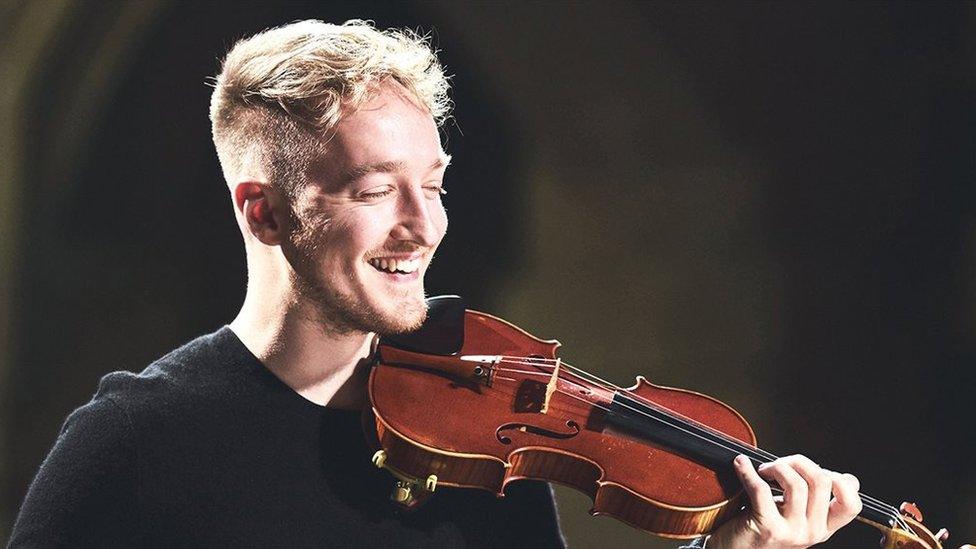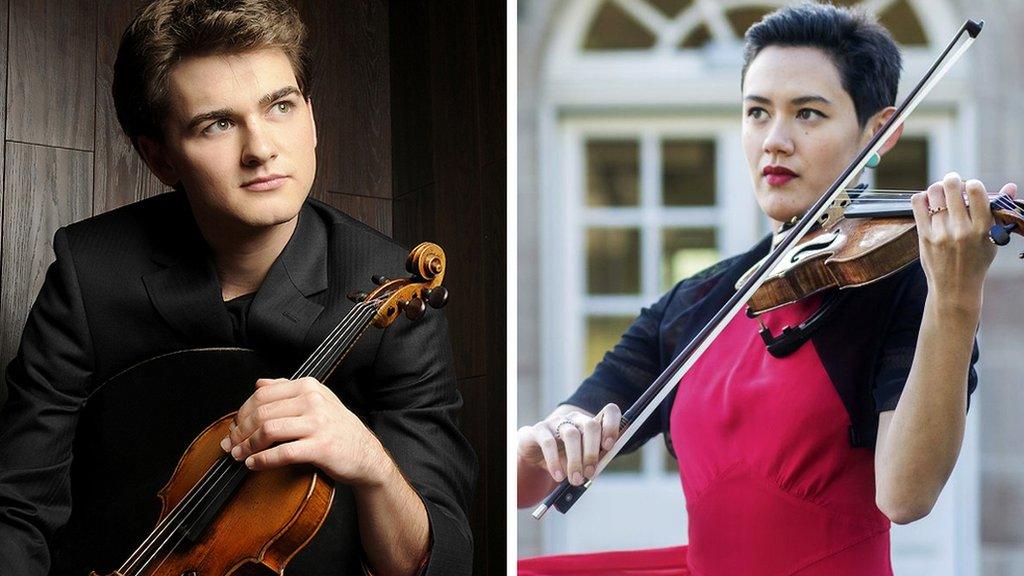The 'implicit danger' of a violin concerto
- Published

Daniel Pioro will premiere a new violin work by Radiohead's Jonny Greenwood at this year's Proms
The concerto is the ultimate display of musical virtuosity - pitching a soloist against the orchestra as they alternate, compete and combine in a constantly changing dialogue.
Those dynamics are crystallised in the word concerto itself, which has two, apparently contradictory, meanings: Competition and agreement.
But the tension explains why these pieces have become such a favourite with composers and audiences alike: It's a thrill to see performers pushed to their limit, generating astonishing displays of dexterity and musicality.
Some performances have even higher stakes: Beethoven only finished his violin concerto on the day of its premiere in December 1806, forcing soloist Franz Clement to sight-read parts of his performance (according to legend, Clement was so annoyed that he interrupted the performance to premiere a composition of his own, played on one string, with the violin held upside down).
Tchaikovsky's sole violin concerto, meanwhile, was so demanding that it was called "unplayable" - or "unviolin-able" - when it was first published.
"It's a feat of stamina," admitted Nicola Benedetti before performing it at the Royal Albert Hall this summer, external, "no other concerto comes close".
This year, the Proms has shone a spotlight on the violin concerto with 10 works, old and new, peppered throughout the season. So what's it like to perform one of these pieces at the world's biggest festival of classical music?
We spoke to three soloists - Nathaniel Anderson-Frank, who led a tribute to Proms founder Henry Wood on 31 August; Stephanie Childress, who'll play at Proms in the Park in Glasgow on 14 September; and Daniel Pioro, who premieres a new violin work by Radiohead star Johnny Greenwood, Horror Vacui, on Tuesday night.


Nathaniel Anderson-Frank and Stephanie Childress
Why are violin concertos such a big draw?
Daniel: "I'm not sure that they are. Beautiful music is a big draw. Music that means something, that provokes, that births new ideas. Music that is sentimental too, and stirs memories. Some of these precious ingredients are found in violin concertos and I think that is what is loved, not the violin concerto in itself."
Nathaniel: "But there's also the implicit 'danger' in the concerto format, to which audiences respond: A lone soloist is pitted against the massed forces of the orchestra. The violinist is like a high-wire tightrope walker, totally calm and concentrated, while executing astonishing feats with grace and beauty. "
Tchaikovsky's concerto was originally called "unviolin-able". How have you approached it?
Stephanie: "It was actually was one of the first concertos I ever played with an orchestra and I'd agree with the idea it's 'un-violinistic' in its writing, particularly the semiquaver passages in the first movement. Structurally it also seems quite unbalanced, with a very long, repetitive first movement. However, I don't think indulging in every single phrase - as many performers do - is wise in this case. The piece has so much energy and life in it, it should not be held back!"
Daniel: "It's just the most beautiful piece of music. Living with the work will make it yours, and this is definitely a piece worth living with."
Allow YouTube content?
This article contains content provided by Google YouTube. We ask for your permission before anything is loaded, as they may be using cookies and other technologies. You may want to read Google’s cookie policy, external and privacy policy, external before accepting. To view this content choose ‘accept and continue’.
How do you keep familiar pieces by Mozart, Brahms and Stravinsky fresh and spontaneous?
Stephanie: "I find that listening to interpretations other than your own can be very enlightening, if not troubling!"
Nathaniel: "I also find that time spent away from the instrument can provide musical rejuvenation - walks in the woods, swimming in the sea. For me, that connection to the natural world is vital."
Daniel: "It's not my job to play music, I do it because I love it. Spontaneity is very easy this way. There are no patterns to replicate, and no context in which I cannot change my mind or see things differently."
Stephanie: "Being 'in the moment' during a performance can also lead you through different versions of the same phrase."
Do you find your interpretation changes when you play with different orchestras and conductors?
Stephanie: "Every time you play with an orchestra, you have the power to establish a dialogue unique to that time and place. My fundamental thoughts about a piece might not necessarily change, but the way I achieve a joint interpretation with a group of players will inevitably be different on every occasion."
Nathaniel: "Yes, certainly. Every ensemble has a slightly different interpretation of where the beat falls in relation to the conductor's gesture. As a leader I am especially aware of these differences, and you have to remain flexible to adapt as required."
Daniel: "It's a beautiful thing when you can learn from your collaborators, but it's not the key to creativity. That key is only within you. Actually, as I think on this, the question itself becomes quite strange. Imagine if you had so little sense of self, or such a limited idea of the music you want to make that it changed depending on who you played with. It'd be like changing your mind every single time you spoke to a new person."
Radiohead star Jonny Greenwood prepares for his first Prom
What's your favourite concerto to play?
Nathaniel: "I have always been drawn to the Beethoven Concerto for its depth of emotion and expression, achieved with such extraordinary economy of musical material."
Stephanie: "Currently, my favourite concerto is Bohuslav Martinu's Second Violin Concerto, although I've never performed it! It's not often played which is a shame, but the solo line weaves a very complex narrative, which I think breaks with a lot of other more 'traditional' approaches to the concerto. The orchestration is also incredibly rich which is one of Martinu's trademarks."
Daniel: "Thomas Adès' Concentric Paths: a work that somehow manages to encapsulate life cycles and time. I don't even know where to begin as I can't fathom how he wrote it in the first place, but it's satellites and astrophysics and discovery in a single piece of music. So much happens in the stillnesses; and in the fastest, most complex passages, time stands still."
Allow YouTube content?
This article contains content provided by Google YouTube. We ask for your permission before anything is loaded, as they may be using cookies and other technologies. You may want to read Google’s cookie policy, external and privacy policy, external before accepting. To view this content choose ‘accept and continue’.
Finally, what can you tell us about the violin you're playing at the Proms?
Daniel: "It's a violin by Christoph Götting, a true master of modern violin making. It is modelled on the Viotti Strad, as I requested when I met him."
Nathaniel: "I use two different instruments at the moment. One is a 1682 violin from Turin by Giofreddo Cappa; the other is a 2019 instrument made in London by Alexandre Valois. Both are beautiful and inspire me in different ways. Listeners just have to guess which one I'm using at the Proms!"
Stephanie: "I'm playing a gorgeous violin made by Francesco Gobetti in around 1710, which I came across in 2014 after many years of searching for a new instrument. It's very important to find an instrument which matches your level whilst pushing your standard of playing. I fell in love with it the moment I played it and have never looked back. My bow was made by François Nicolas Voirin, one of the most celebrated French bow-makers of the last 300 years - it's honestly the best bow I've ever played so I hope to never part ways with it!"

Follow us on Facebook, external, or on Twitter @BBCNewsEnts, external. If you have a story suggestion email entertainment.news@bbc.co.uk, external.